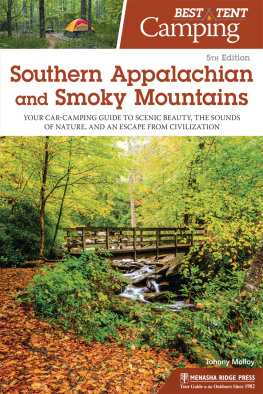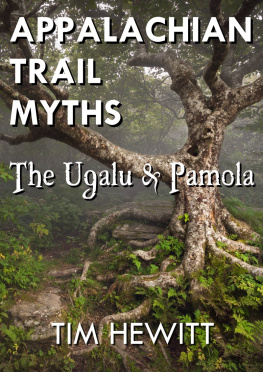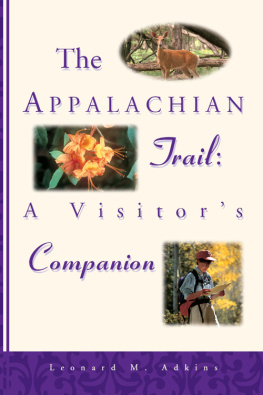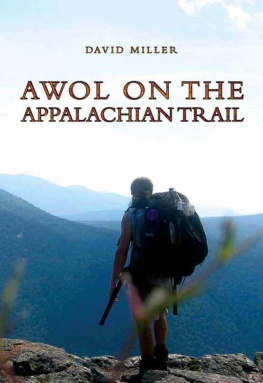Beyond the MountainsSERIES EDITOR
James C. Giesen, Mississippi State University
ADVISORY BOARD
Judith Carney, University of CaliforniaLos Angeles
S. Max Edelson, University of Virginia
Robbie Ethridge, University of Mississippi
Ari Kelman, University of CaliforniaDavis
Shepard Krech III, Brown University
Megan Kate Nelson, www.historista.com
Tim Silver, Appalachian State University
Mart Stewart, Western Washington University
Paul S. Sutter, founding editor, University of Colorado Boulder
Beyond the Mountains
COMMODIFYING APPALACHIAN ENVIRONMENTS
Drew A. Swanson
appeared as Marketing a Mountain: Changing Views of Environment and Landscape on Grandfather Mountain, North Carolina in Appalachian Journal 36, no. 1/2 (2008): 3053. Reprinted courtesy of Appalachian Journal. A version of the epilogue appeared as Mountain Meeting Grounds: History at an Intersection of Species, in The Historical Animal, edited by Susan Nance (Syracuse, N.Y.: Syracuse University Press, 2015), 24058. Reprinted courtesy of Syracuse University Press.
2018 by the University of Georgia Press
Athens, Georgia 30602
www.ugapress.org
All rights reserved
Set in 10.5/13.5 Adobe Garamond Pro Regular by
Graphic Composition, Inc., Bogart, Georgia
Most University of Georgia Press titles are available from popular e-book vendors.
Printed digitally
Library of Congress Cataloging-in-Publication Data
Names: Swanson, Drew A., 1979author.
Title: Beyond the mountains : commodifying Appalachian environments / Drew A. Swanson.
Other titles: Environmental history and the American South.
Description: Athens : The University of Georgia Press, [2018] | Series: Environmental history and the American South | Includes bibliographical references and index.
Identifiers: LCCN 2018019190| ISBN 9780820344874 (hardback : alk. paper) | ISBN 9780820353975 (ebook) | ISBN 9780820353968 (pbk. : alk. paper)
Subjects: LCSH: Human ecologyAppalachian Region, SouthernHistory. | Natural resourcesAppalachian Region, SouthernHistory. | Appalachian Region, SouthernEnvironmental conditions.
Classification: LCC GF504.A5 S93 2018 | DDC 333.70975dc23
LC record available at https://lccn.loc.gov/2018019190
To Cindy, Mom, and Dad,
three mountain Swansons
CONTENTS
, by James C. Giesen
FOREWORD
Regional histories are hard to write. To do it well, authors have to link together two impulses that may seem contradictory on the surface: what is unique and what is common, what elemental quality of the place lies apart from the world around it and what is a product of it. Readers generally come to histories of an area, whether the Mississippi Delta or the Mekong Delta, with some boiled-down sense of what has defined that place, and it is the historians challenge to explain what aspects of those regional preconceptions come from a places insularity and what aspects are derived from its connections to the people and places around it. Regional environmental histories are even more complicated. Scholars must explain the ways in which the natural world shaped, even defined, a place, while stopping well short of explaining the sum of human action solely as the result of natural forces. Unfortunately, regional determinism and its environmental cousin have been powerful forces in popular and even scholarly conceptions of places, conceptions that have been particularly trenchant in the American South.
This brings us to the Appalachian mountain range, a locale to which Americans have ascribed all kinds of ideas about both human culture and nature. While academic scholars have contributed book after book pointing out the nuances of the regions society and economy, the popular image of the people and places in the mountains remains relatively flat. The rugged and harsh environment of the southern range, the old stereotype goes, produces people and culture that reflect those forces simply. In other words, nature determined Appalachian culture and Appalachians are constrained by that nature. The region lives in the American mind set apart from the rest of the nation.
What follows is a history of Appalachia that confronts regional and natural determinism head-on. Drew Swanson seeks to understand the uniqueness of the southern Appalachians through its many connections to the world around it, especially by exploring those people and institutions that came into the region in search of natural assets that could be taken away, packaged, and sold. At the center of this storyreally a series of storiesis this commodification of the region and its plants, animals, minerals, people, weather, and views. For Swanson, to understand Appalachia means to appreciate not only the diversity of environments contained within it, but also the breadth of ways that people have shaped and been shaped by these forces. The various ways people interacted with nature and with the commodities that they extracted from it teach us, then, not just the varied nature of the southern Appalachian range, but also how the region was a part of the historical forces at work in the United States and across the globe.
The books importance to southern environmental history is revealed in both the details of Swansons telling and the sum of its parts. Though the chapters are chronological, each is centered on a commodity. Therefore, as he moves through time, the reader sees how a single aspect of naturewhether deer skins, gold, electricity, even tourismis both created by its connection to the outside world and in turn influenced by outsiders understanding of it. The approach works in great measure because of his insistence on the range of people, places, and things that should be considered commodities. Coal and salt, he argues, are not as different from electricity and tourism as we may have believed. His characters are not only the crags and valleys or the flora and fauna but actual humans, almost all of whom were trying to get something from those mountains. There are lots of scientists in Swansons mountainsbotanists, geologists, biologists, pedologists, herpetologists, and nuclear physicistsbut their work appears alongside the more traditional historical characters we associate with Appalachiathe farmers, miners, and soldiers. The result is an argument that is not as obviously environmental as one might expect. Likewise, Swansons refusal to concentrate only on those commodities that are already well understood, coal and timber for instance, makes the argument all the more important. Indeed, what I think is so refreshing about this book is the way that Swanson pitches the history of the Appalachian environment as non-determinist. This offers a break from what most environmental historians and Appalachian scholars have said about the region.
Having grown up on the edge of the Appalachian range, Swanson begins and ends the book with his own tromps through the woods and hikes in the mountains. His understandings of the landscape undergird much of the book, from vivid descriptions of vistas to the thrills of uncovering an endangered salamander under a rock. Indeed, Swanson has emerged as one of the most productive and influential voices of southern environmental history in large part because of this ability to blend landscape and environmental history with more traditional social and economic narratives. This, his third book and his second in the Environmental History and the American South series, rises to the challenge that few scholars have taken on, that of a complex environmental history of the southern Appalachian range. It finds good company in the series. Alongside histories of plantations, oystering, soil erosion, and many other topics,












